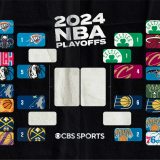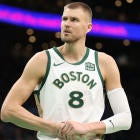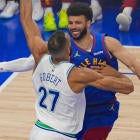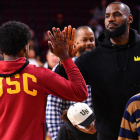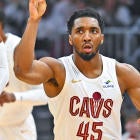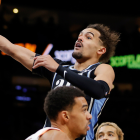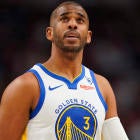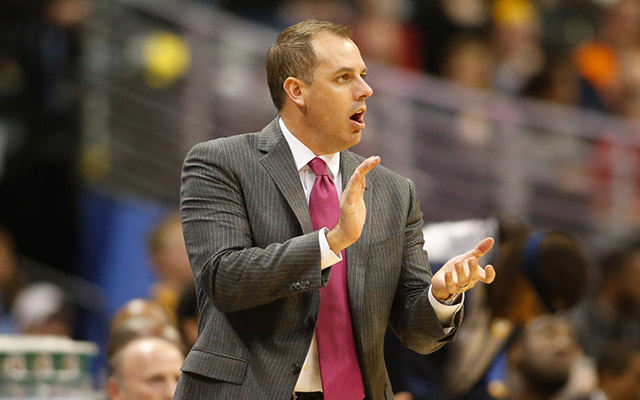
DENVER-- It's a weird day at the Pepsi Center in downtown Denver. The city has only one professional basketball team, a fact that would seemingly surprise many of the citizens if you told them, before they asked you what his has to do with Broncos. But there are in fact three teams in the house this December day. The Nuggets and Clippers have held shootarounds that morning before their 7 p.m. tip. The building is nearly empty later in the afternoon as the Indiana Pacers shuffle their way through the cold and upstairs to the practice court.
The Pacers are in town early, finding themselves with a two-day break after their loss to the Clippers on Wednesday night, and have taken the opportunity to get in early, adapt to the altitude, and get in a precious full practice during the season.
The NBA season is a grind, and for the Pacers this season, its gears are tougher than usual. The Pacers have played 18 of their 32 games against the brutal Western Conference. They started out the season missing David West, and soon C.J. Watson, C.J. Miles, Rodney Stuckey, and Ian Mahinmi missed time. Oh, and starting point guard George Hill? Yeah, he only returned in the last few weeks from a torn quadricep. Looming over all of this, of course, is the shadow of Paul George, expected to miss the entire season after a gruesome leg injury in a Team USA exhibition, making this season all the more cruel.
So, in light of all that, the Pacers are struggling as expected. They were shorter on talent this year than last when Lance Stephenson left. They were devastated, talent-wise and emotionally, by the George injury. Whihe the other injuries are tiny collisions, they still break off pieces of the good ship Pacer, leaving this squad with no margin of error. They must play sound basketball every night, on both ends, do as much as they can to create simple opportunities, and then catch some breaks. Oh, and they better make some shots, something this team wasn't built to do -- even when it was a title contender.
And yet, the Pacers (11-21 going into Wednesday's game vs. Miami) are not bad. Let me put it this way. If the Pacers' talent played like the Knicks do, they'd be battling the Sixers (and the Knicks) for the worst record in basketball. And if the Knicks' talent played the way the Pacers do, they'd likely be battling Brooklyn for a playoff spot. But it's a constant, frustrating experience for this team that continues to hunker down and stick with one another.
The Pacers are 18-12-2 against the spread. That doesn't mean the Pacers are good, that just means that they are considerably better than experts (factoring in the line action) think they are. Indiana is 5-12 on the road, but 11-3-1 against the spread. They perform better than you would think, but just can't figure out a way to win.
That's where I start the conversation with coach Frank Vogel, because if you're going to understand how the Pacers are three games back of the playoffs, beyond just saying, "the East," you have to look at their culture.
I share with Vogel his team's record against the spread, stressing that number doesn't mean anything to him, but that it suggests that the team is better than people would think.
"That's what I feel," Vogel says. "I'm not looking at spreads, but I feel like we're better than our record would suggest. We haven't gotten a payoff for the level that we've been playing. Our schedule has been brutal, and we've had guys in and out. We understand we're going to take our lumps, but we've got to stay together, and continue to play winning basketball."
It's been four years since Vogel took over the Pacers as midseason replacement for Jim O'Brien. Vogel was widely unknown, but led the Pacers to the playoffs and an encouraging series vs. the Bulls. From then on, the Pacers fell to the Heat in tough series for two straight seasons, becoming the rival to Miami's mini-dynasty the way it was expected of the Bulls. And despite last year's collapse after an unbelievable start, optimism remains with a core built around George -- when he returns -- and Roy Hibbert.
But for as much as individual talent is the starting block for success in the NBA, organizational foundation and culture is what translates that talent into consistency, and consistency is the real formula for success in the NBA. Consistency allows you an advantage each possession, game after game. And the Pacers have built a tremendous culture in Indiana. Not only did Indiana not fire Vogel after team chemistry combusted during the second half of last year, but rewarded his success with an extension. It was a giant, "Thanks, but we know what we've got" from team president Larry Bird and the Pacers' brain trust, showing faith in the process over results.
And Vogel's process is painstaking. His film habits were outlined in detail by the Indianapolis Star before the season, and the Pacers spend more time watching video of their games together than they do practicing. He admitted in a podcast with Grantland that outside of spending time with his family, watching basketball is pretty much what he does, all the time. He's on the more progressive side of the coaching scale when it comes to the use of advanced metrics, and when you watch the Pacers, their players are still committed to the same fundamental concepts, whether it's Chris Copeland and Donald Sloan, or their star players.
That commitment to process is the backbone of the Spurs, but the Spurs didn't invent it, nor are they the only team with such a structure. The teams that you see succeeding despite injuries, when things haven't gone well in terms of player fortune, like Miami this season and Memphis last, they're reliant on those cultures. So while the Pacers work through this season, Vogel says the work being done in these losses is still important.
"Even if you don't win," Vogel says, "you develop those habits that are going to turn your fortunes with the record. As guys get healthy, as we hit more manageable parts of the schedule, hopefully we get better each month."
It would be easy for a coach used to working with All-Stars and competing for the top seed in the conference to be frustrated with the lack talent at his disposal each night. But Vogel instead is encouraged by what he's seen from this group, in what he calls the "purity of effort" of the team.
"There's a lot of fundamentals that need to improve," he says, watching players get in exttra work after practice, "details that need to improve. But we're playing the way we want to play. There's a purity to the group's effort that I'm really proud of."
You would think a team that spends so much time in the film room would be constantly berated for their performance, their every mistake exacerbated and rehashed day by day. But as first outlined in the Star's feature, Vogel puts a priority not on just showing where the team needs to improve, but where the players are doing good things. In fact, Vogel says positive reinforcement is more important than constructive criticism.
"There's a lot of correction that goes on in any coach's film session," he says, "but I was just thinking to myself yesterday, that when you watch film with the team and you see a guy doing what he's supposed to do, that's very, very rewarding. They have to see that. That goes before any kind of negative corrections.
"A guy does a pivot move or a sink or a rotation, and us saying 'This is what it's supposed to look like,' I think that's way more effective."
There are certainly more losses than a team that was 25-6 at this time last season, cruising on its way to homecourt in the playoffs. But I thought that even though the Pacers are a largely veteran squad, this season might be more fun for Vogel. He's not dealing with the constant attention and pressure of a team in contention. There's more coaching to be done. It's a challenge sure, but isn't it more rewarding in some way, especially without the expectations?
Nope.
"I think it's harder because you're losing," he says, shaking his head. "I think it's harder to keep everybody together, to get everyone to believe in what they're doing. To their credit, they've stuck together and hung with the things that have been successful for us for the last couple of years."
For as much as Vogel's coaching has helped keep the team afloat, the players have bought in. David West is the veteran leader, and the team has indeed stuck together. Again, compare that with what's going on with the Knicks, and you see that the makeup of a team's chemistry can have serious impacts.
But the Pacers are still 11-21 after a heartbreaker loss to the Bulls Monday night. They're ten games under .500. That's a bad team, by any objective look at the results. The Pacers are impressively sound on defense, eighth in points allowed per possession, but 29th in the league in offense. Even in a better December, Indiana remains 28th in that category. The same problems that have plagued them through the years, and inability to score consistently, have gone nuclear without George (and Stephenson, if you want to go down that road).
In the Western Conference, their season would be over. But good news: they play in the East, so they're well within range of the eighth seed, and after playing the ninth-hardest schedule in the league according to Basketball-Reference, there's reason to believe that this part of the season will be better than the last. Vogel, though, says the team isn't taking anything comforting away from, or even paying attention to, their proximity to the playoff spot.
"We've just got to get better. we're not even really looking at the standings. We're just trying to get wins. Play the right way, play better than our opponents every night."
Indiana would have been .500 in their last ten games had they been able to finish off the Bulls Monday. They're getting there. But can they get healthy, take advantage of the East, and manage to win just enough games to make the playoffs? There's little organizational benefit to that. The team has maintained that they "don't expect" Paul George back for the playoffs, and players rarely if ever return in the postseason having missed the regular season. They're just not up to playing speed.
But there he was on this December day, five months from the start of the postseason, getting up jumpers after practice.
In doing research for this post, I watched a lot of video of the Pacers last year, and this year. And I kept coming back to one thought. "Man, I miss watching Paul George play basketball."
"I do too, yes, very much so," Vogel deadpans when I share this with him, fighting back a grimace. "He's just such a special talent, and the way he impacts both ends of the floor very admirable. I really enjoy coaching him and I can't wait to see him back out there."
That will probably not be this year. The Pacers are probably simply too undermanned to make any significant run this season. But they're better than you think they are, and they'll keep working on the same things that made them contenders. The Pacers aren't going anywhere. And you had best not overlook them.
After the buzzer
• I asked Vogel if he ever uses shot charts in coaching. I'm fascinated that players outright reject them as a useful tool. They literally have no interest, at least the players I've spoken with, about using a chart that shows where they actually shoot better and worse from, this season, over their career, whatever, to guide their decision making. And Vogel says that they provide information on shot quality, but never use charts.
"We use ranges. We have shot charts. I think saying a guy he's one percentage from the right corner vs. the left, I don't think it does anything. I think telling a guy he's good from the arc, from 17 to the 3, from 17 to the five, that's more effective."
• Coaching is, essentially a job of decision-making. That's 99 percent of the job, is simply deciding what to do with the assets and personnel available to you. But while end-game situations are mercilessly broken down, and rotations are frequently criticized, few realize the scope of decisions that an NBA coach is responsible for.
"[There are] dramatically more [decisions] than most people realize," Vogel says. "It's everything from when to practice, when not to practice, how long should film sessions go, how to treat off days, mange your own rotations, manage matchups, play-calling situations in the game, combo of players, where should they be going, what hotel you stay in. Do you travel after the game or before the game. The management decisions are what people don't realize. You're not just coaching."







